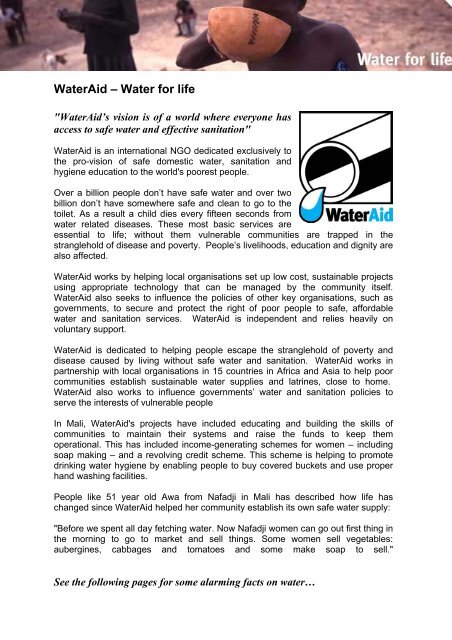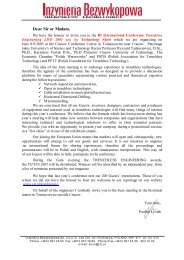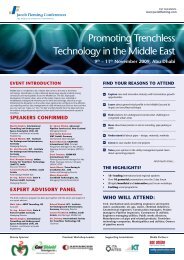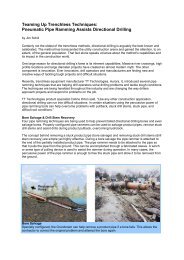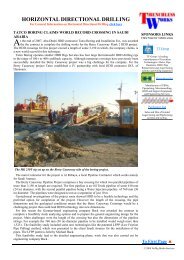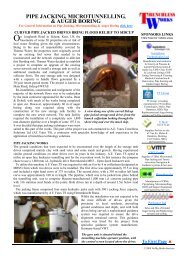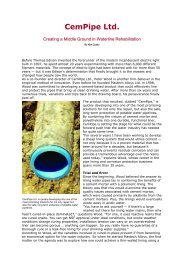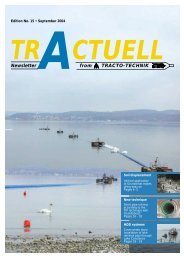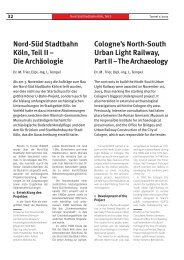WaterAid â Water for life - nodig-construction.com
WaterAid â Water for life - nodig-construction.com
WaterAid â Water for life - nodig-construction.com
You also want an ePaper? Increase the reach of your titles
YUMPU automatically turns print PDFs into web optimized ePapers that Google loves.
<strong><strong>Water</strong>Aid</strong> – <strong>Water</strong> <strong>for</strong> <strong>life</strong><br />
"<strong><strong>Water</strong>Aid</strong>’s vision is of a world where everyone has<br />
access to safe water and effective sanitation"<br />
<strong><strong>Water</strong>Aid</strong> is an international NGO dedicated exclusively to<br />
the pro-vision of safe domestic water, sanitation and<br />
hygiene education to the world's poorest people.<br />
Over a billion people don’t have safe water and over two<br />
billion don’t have somewhere safe and clean to go to the<br />
toilet. As a result a child dies every fifteen seconds from<br />
water related diseases. These most basic services are<br />
essential to <strong>life</strong>; without them vulnerable <strong>com</strong>munities are trapped in the<br />
stranglehold of disease and poverty. People’s livelihoods, education and dignity are<br />
also affected.<br />
<strong><strong>Water</strong>Aid</strong> works by helping local organisations set up low cost, sustainable projects<br />
using appropriate technology that can be managed by the <strong>com</strong>munity itself.<br />
<strong><strong>Water</strong>Aid</strong> also seeks to influence the policies of other key organisations, such as<br />
governments, to secure and protect the right of poor people to safe, af<strong>for</strong>dable<br />
water and sanitation services. <strong><strong>Water</strong>Aid</strong> is independent and relies heavily on<br />
voluntary support.<br />
<strong><strong>Water</strong>Aid</strong> is dedicated to helping people escape the stranglehold of poverty and<br />
disease caused by living without safe water and sanitation. <strong><strong>Water</strong>Aid</strong> works in<br />
partnership with local organisations in 15 countries in Africa and Asia to help poor<br />
<strong>com</strong>munities establish sustainable water supplies and latrines, close to home.<br />
<strong><strong>Water</strong>Aid</strong> also works to influence governments’ water and sanitation policies to<br />
serve the interests of vulnerable people<br />
In Mali, <strong><strong>Water</strong>Aid</strong>'s projects have included educating and building the skills of<br />
<strong>com</strong>munities to maintain their systems and raise the funds to keep them<br />
operational. This has included in<strong>com</strong>e-generating schemes <strong>for</strong> women – including<br />
soap making – and a revolving credit scheme. This scheme is helping to promote<br />
drinking water hygiene by enabling people to buy covered buckets and use proper<br />
hand washing facilities.<br />
People like 51 year old Awa from Nafadji in Mali has described how <strong>life</strong> has<br />
changed since <strong><strong>Water</strong>Aid</strong> helped her <strong>com</strong>munity establish its own safe water supply:<br />
"Be<strong>for</strong>e we spent all day fetching water. Now Nafadji women can go out first thing in<br />
the morning to go to market and sell things. Some women sell vegetables:<br />
aubergines, cabbages and tomatoes and some make soap to sell."<br />
See the following pages <strong>for</strong> some alarming facts on water…
Global water and sanitation facts<br />
• When <strong>com</strong>bined water, sanitation and hygiene reduce<br />
the number of deaths caused by diarrhoeal diseases by<br />
an average of 65%<br />
• The weight of water that women in Africa and Asia carry<br />
on their heads is <strong>com</strong>monly 20kg, the same as the<br />
average UK airport luggage allowance<br />
• 2.2 million people in developing countries, most of them children, die every year<br />
from diseases associated with lack of access to safe drinking water, inadequate<br />
sanitation and poor hygiene<br />
• At least 90% of drinkable water in the world is underground. This source of<br />
water is increasingly threatened with depletion and contamination<br />
• Since 1950 the world population has doubled but water consumption has<br />
increased six-fold<br />
• Diarrhoea alone kills 1.8 million children under five every year, but most cases<br />
can be prevented or treated.<br />
Key <strong><strong>Water</strong>Aid</strong> facts<br />
• A child dies every 15 seconds from water-related diseases. This amounts to<br />
nearly 6000 deaths, or the equivalent of 20 jumbo jets crashing, every day<br />
• <strong><strong>Water</strong>Aid</strong> projects providing safe water, sanitation and hygiene education cost<br />
just £15 per head<br />
• 1.1 billion people in the world do not have access to safe water, this is roughly<br />
one sixth of the world’s population<br />
• 2.6 billion people in the world do not have access to adequate sanitation, this is<br />
roughly two-fifths of the world’s population<br />
• It is 12% more likely that children will attend school if water is available within<br />
15 minutes rather than one hour's walk. 11% more girls attend school when<br />
sanitation is available<br />
• The simple act of washing hands with soap and water can reduce diarrhoeal<br />
diseases by over 40%<br />
<strong>Water</strong> use<br />
• The average person in the UK uses 135 litres of water every day<br />
• The average person in the developing world uses 10 litres of water every day<br />
<strong>for</strong> their drinking, washing and cooking. This is the same amount used in the<br />
average flush of a UK toilet<br />
• On current trends over the next 20 years humans will use 40% more water than<br />
they do now
• The average amount of water needed to produce one kilogramme of potatoes is<br />
1000 litres, wheat is 1450 litres and rice is 3450 litres<br />
• Agriculture accounts <strong>for</strong> over 80% of the world’s water consumption<br />
• 40 billion working hours are spent carrying water each year in Africa<br />
<strong>Water</strong> resources<br />
• Only 0.008% of the planet's water is available <strong>for</strong> human<br />
consumption, and is found in lakes, rivers and underground<br />
aquifers<br />
• It would cost an estimated extra US$16 billion each year to<br />
reach the Millennium Development Goals, agreed by all UN<br />
Governments, of halving the proportions of people without<br />
access to safe water and sanitation. This is less then North<br />
Americans and Europeans spend on pet food in one year<br />
• Icecaps and glaciers hold 74% of the world’s freshwater. All<br />
the rest is deep underground or locked in soils as moisture or<br />
permafrost. Only 0.3% of the world’s freshwater is found in<br />
rivers or lakes<br />
• Over 80 countries with 40% of the world’s population are<br />
subject to water shortages<br />
• The number of people living in water-stressed countries is<br />
projected to climb from 470 million to three billion by 2025.<br />
(NB The threshold <strong>for</strong> ‘water stress’ is a per capita<br />
availability of 1700m3 of water. For water scarcity the<br />
threshold is 1000m3.)<br />
“I <strong>com</strong>e to this water hole<br />
once a day and fill up two<br />
20 litre buckets. It takes<br />
me over an hour to fill up<br />
the buckets. The six<br />
people in my family have<br />
to use just these two<br />
buckets.’’<br />
• Your donations really do make a difference:<br />
• £3 pays <strong>for</strong> a latrine cover slab serving a family of up to seven people<br />
in Nepal<br />
• £460 pays <strong>for</strong> two public water points used by 500 people in Ethiopia<br />
• £4000 pays <strong>for</strong> <strong>com</strong>munity-wide hygiene and sanitation training<br />
benefiting 1000 people in Tanzania<br />
•<br />
For more in<strong>for</strong>mation on what <strong><strong>Water</strong>Aid</strong> does and how you can support<br />
them go to www.wateraid.org


